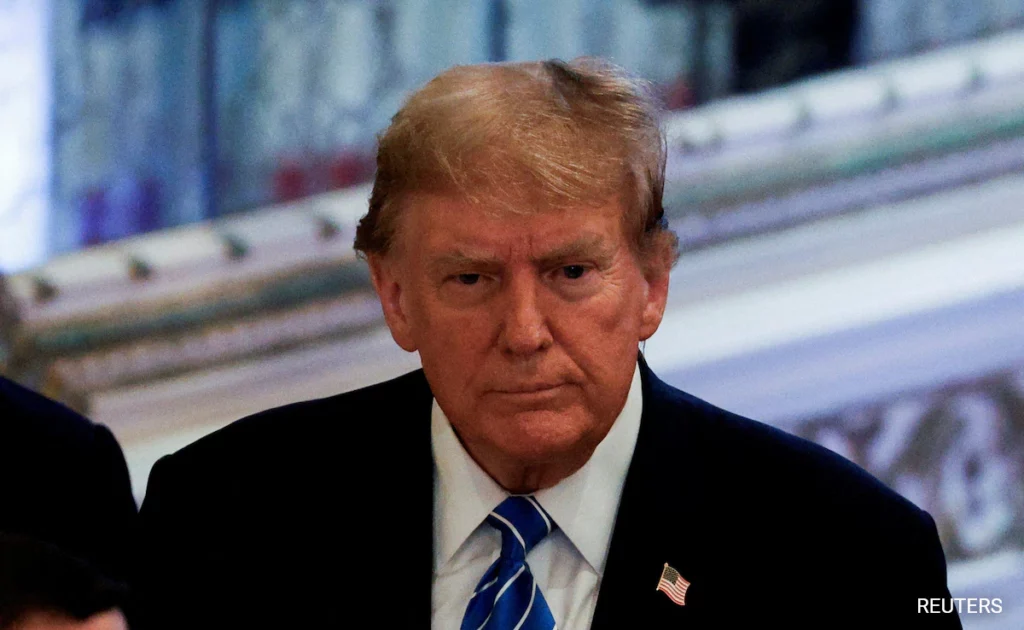
According to Donald Trump’s legal team, the former president is encountering difficulties in securing an insurance company willing to underwrite his bond to cover the substantial judgment against him in the New York attorney general’s civil fraud case. Trump’s lawyers informed a New York appeals court of his struggles, noting that despite approaching approximately 30 underwriters, none have agreed to back the bond required by the end of the month.
In their statement, Trump’s attorneys highlighted the significant challenge posed by the size of the judgment, which exceeds $464 million, including interest. They emphasized that very few bonding companies are willing to consider issuing a bond of such substantial magnitude. Notably, while Trump himself was ordered to pay $454 million, the total amount includes disgorgement for his adult sons, Don Jr. and Eric.
Gary Giulietti, an insurance broker who provided testimony on behalf of Trump during the civil fraud trial, has submitted an affidavit stating that securing a bond for the full amount is deemed “a practical impossibility.”
According to Trump’s legal representatives, potential underwriters are insisting on cash as collateral to support the bond rather than accepting properties.
Trump’s legal team has petitioned the appeals court to postpone the bond requirement until the conclusion of his appeal process, citing the substantial value of Trump’s properties, which they argue exceeds the judgment amount. Should the appeals court rule unfavorably, Trump has requested a further delay in posting the bond until his appeal reaches New York’s highest court.
Expressing his view on Monday, Trump asserted that posting the bond was “practically impossible.”
Taking to Truth Social, Trump decried the size of the bond as “unConstitutional, un-American, unprecedented, and practically impossible for ANY Company, including one as successful as mine.” He claimed that bonding companies were unfamiliar with such a sizable bond and lacked the capability to furnish it, even if they were willing.
In a recent ruling, New York Judge Arthur Engoron ordered Trump to pay $355 million in disgorgement, or “ill-gotten gains,” as part of a civil fraud case brought by New York Attorney General Letitia James. Engoron’s decision, outlined in a 93-page document, found Trump and his co-defendants, including his adult sons, liable for fraud, conspiracy, and the dissemination of false financial statements and records. The judgment amount, including interest, exceeds $450 million.
Trump is currently appealing the ruling, but to prevent the state from enforcing the judgment, he must furnish a bond to be held in an account throughout the appellate process, a procedure that could stretch over several years.
Earlier this month, Trump submitted a $91.6 million bond as part of his appeal in the E. Jean Carroll defamation case. However, Gary Giulietti explained that major underwriters, bound by internal policies, refrain from issuing bonds exceeding $100 million. None of these entities, even some of the world’s largest insurance companies, are willing to accept real estate as collateral; they only feel comfortable with cash or stock.
Taking into account associated fees and interest, Giulietti estimated that Trump would need to come up with over $550 million. He emphasized the unprecedented nature of the appeal bond’s size, stating, “After substantial good-faith effort over the last several weeks, obtaining an appeal bond for the Judgment Amount of over $464 million is just not possible under these circumstances.”
Alan Garten, the top legal officer of the Trump Organization, attested in a sworn statement that Chubb, the insurer behind Trump’s $91.6 million bond for the Carroll judgment, was unable to accept real estate as security for the civil fraud bond. Garten identified the refusal of underwriters to accept real estate as a significant hurdle in securing the bond.
In response to the staggering size of the fraud judgment, Trump campaign spokesman Steven Cheung condemned it as an abuse of the law. He asserted that such a bond would contradict fundamental principles of the republic and undermine the rule of law in New York. Cheung vowed that President Trump would persist in combatting what he termed as “Crooked Joe Biden-directed hoaxes” and would continue his mission to Make America Great Again.
